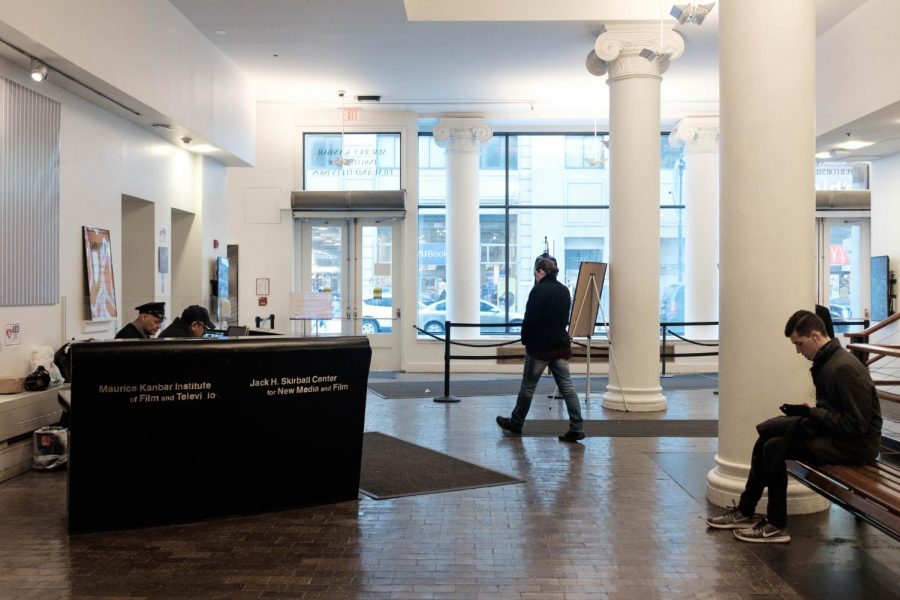The Burden of the Student
April 9, 2018
Drama student Lucy once had a teacher tell her she couldn’t play a role because it was meant for a “pale young woman.” She said she believed it would negatively impact her training if she confronted her teacher or reported this incident.
“My fear is always having to work twice as hard but now having to work three times as hard because you overstepped your bounds with your teacher, in their eyes,” Lucy said. “As black students — as students of color, we have to fight to be viewed as equal or on the same plane as our white counterparts.”
Tamara said the effort involved is just one reason why students choose not to report injustices they experience.
“Your freshman year, you come in enthusiastically and you’re like ‘oh yeah, I’ll just report everything that happens’ and as it happens so much, you’re kind of like ‘I am tired of reporting all of these things,’” Tamara said. “Even if you do report it, you don’t know who’s going to handle it. You don’t know where they stand, if you are going to remain anonymous and if it is going to negatively backfire.”
Furthermore, when Tamara did report incidents to her trusted teachers, she said she was not offered much help.
“I hated reporting these incidents because I could walk in that room bawling my eyes out and they would say the same thing every time — ‘you’re so resilient, you can handle this, just talk to the professor’ — so I would talk to somebody higher up and they would say the same thing,” Tamara said. “That really doesn’t help because I am in such a vulnerable position. If I upset this person, they could give me a bad grade and that’s going to affect my scholarship and future job opportunities. So yeah, I could speak, but it might be better for me to just cry at night instead of risking my grade and risking how I get treated in class.”
Polendo said his goal is to create multiple avenues for students to have their voices heard. He created a regular meeting called the “Community Call-In” and has supervised the creation of student leadership teams and affinity groups.
“One of the most problematic things that can happen, and I speak from my own experience as a queer artist of color, is that my voice is taken away,” Polendo said. “The space of injury, aggression, misconduct and etc. is a very personal one. Therefore, it is also not for me to decide exactly how it happens but rather to create a range of avenues that creates a multitude of ways to engage in that conversation.”
Tisch Drama junior Leah said they appreciate that the “Community Call-In” and other similar programs may educate some people in the community, but from their experiences, said that the conversations are dominated by privileged students.
“I personally get frustrated — I was sitting in that room thinking why am I receiving this lesson?” Leah said. “Some people are taking up space because they don’t realize how much space they take up. Those talks end up becoming people just voicing how privileged they are and how bad they feel about being privileged.”
Leah said that though they have experienced racially insensitive teacher and peer interactions, they particularly appreciate the alliance and affinity groups as safe spaces.
“Being on the receiving end of problematic habits is rough,” Leah said. “It happens on all levels — faculty have their issues and so do students. If something ever happens, I’m grateful for alliance and affinity groups in Tisch that give space for actors of color to talk about these problems. If I were in a different school that didn’t have these resources, I think my personal well-being would have been way worse.”
Tamara spoke to the environment in the Drama department overall.
“The climate is tense right now in Tisch Drama and in the [Experimental Theater Wing],” Tamara said. “The black and African-American students are fed up with the feeling of having to explain ourselves and being united by pain.”
Polendo said that he thinks the role of the student in the resolution is a very individualized position.
“There are different modes of engaging in the conversation,” Polendo said. “My argument is that as chair, we have to create a space for all of them.”
Tisch Drama senior Mary said that while she has experienced microaggressive incidents, she thinks Polendo’s recent appointment as the Drama chair will be productive for the community.
“I’ve run into people who I think ‘yup, I’m going to detach myself from you,’” Mary said. “Having [Polendo] come in as the drama chair, I feel that will be a good change. I think he’s making some good moves now — but I’m going to graduate, so it won’t affect me as much.”
For the students who still have a ways to go before graduation, Polendo said brighter days are ahead.
“Is there room to grow?” Polendo said. “Yes, absolutely. I wouldn’t be here if there wasn’t.”
A version of this article appeared in the Monday, April 9 print edition. Email Miranda Levingston at [email protected].

